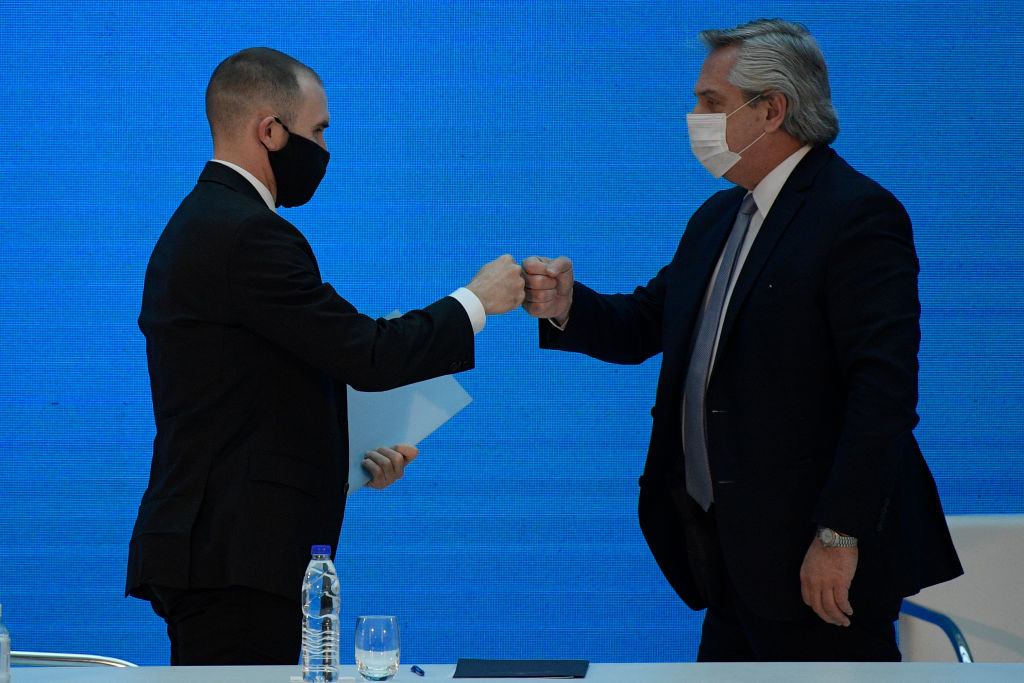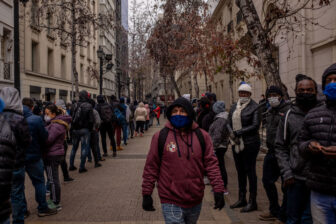The seeds for the latest chapter in Argentina’s long history of confrontations with the International Monetary Fund were planted about a year ago, on the eve of the global pandemic. President Alberto Fernández and Economy Minister Martín Guzmán were putting the finishing touches on a proposal for major debt relief from the government’s bondholders at home and abroad. Fernández had come into office in December 2019 criticizing the IMF’s huge emergency loan negotiated by his predecessor, and announcing his intention to seek debt relief from Argentina’s domestic and foreign creditors, including the IMF.
The resulting fear and uncertainty among investors meant that both the outgoing and incoming administrations lost their ability to roll over maturing obligations – much less obtain new funding – whether in pesos or dollars, except from captive state-owned entities and local commercial banks.
That dearth of investor financing came on top of an economy that was already stagnating in those early months of 2020, with expectations that GDP would contract by about 1.5% over the course of the full year. Inflation was running close to 50% year-on-year. The government budget deficit had reached the equivalent of 4% of GDP and the prospect was that it would widen more in 2020. Cut off from access to capital markets, Fernández and Guzmán became heavily reliant on cash advances provided by the central bank.
Then came COVID-19. News in early March of a first confirmed case, and soon after of a first death, raised the specter of a potentially devastating public health and economic emergency in the months ahead. That led Fernández and Guzmán to hold off on finalizing their proposal to bondholders until mid-April. In May that first draft was rejected by bondholder groups large enough to prevent the super-majorities needed to modify the bonds’ indentures, which specified a requirement for affirmative votes by between two-thirds to 85% of bondholders to change the payment terms.
Fernández and Guzmán raised the pressure on creditors by skipping a $503 million payment that had fallen due, thereby precipitating Argentina’s ninth sovereign default on foreign-law, foreign-currency debt. Yet bondholders were not intimidated, and there followed a tense negotiation process which culminated in mid-August with agreement on a compromise restructuring plan.
By early September, Argentina concluded the comprehensive restructuring of $66 billion of foreign-currency debt subject to foreign law, approved by 95% of its bondholders, as well as of $41 billion of dollar debt under domestic law, thereby curing its ninth default. Fernández and Guzmán obtained a significant reduction in debt-service payments especially during 2020-24.
Instead of having to make principal payments of $48 billion during these five years, the government was now having to repay a mere $6 billion. And rather than keep paying high coupons averaging roughly 7% per annum, the new coupons now averaged around 3%.
Putting the cart before the horse
Yet Argentina’s sovereign debt restructuring was unlike most others: It was undertaken in the absence of a confidence-boosting program of economic stabilization measures and structural reforms, and without the financial support from key multilateral organizations like the IMF and World Bank.
To be sure, the COVID-19 pandemic has significantly complicated the exit from default. As in all other countries, the government budget deficit widened significantly last year because of various pandemic-related spending initiatives and revenue shortfalls. Despite the reduction in interest payments on the public debt equivalent to about 1.5% of GDP, the fiscal deficit doubled from 4% to about 8.5% of GDP in 2020.
The key difference between Argentina and most other pandemic-stricken countries, however, is that its outsized deficit spending has had to be financed almost entirely by the country’s central bank, because Fernández and Guzmán were cut off from access to domestic and foreign capital markets during, and even after, their contentious debt negotiations.
As a result, the monetary aggregates have been expanding by between 60-70% per annum in recent months, auguring higher inflation and greater downward pressures on the peso. The latest consensus forecast is that, despite intensified price and capital controls, inflation this year will accelerate to 50% from last year’s 36%, and dollars in the official market will become 40% more expensive still.
Moreover, there is neither societal consensus nor political will to deconstruct the damaging populist legacy of 2002-2015 by making progress on a long list of pending structural reforms capable of fostering confidence and attracting new investors.
Argentina’s business and regulatory climates – and not just the macroeconomic one – are very poor. There is major judicial and property-rights uncertainty; red tape and other barriers to business are heavy; the tax burden and import restrictions are suffocating; key utility prices are distorted by subsidies and controls; welfare schemes have grown out of control; and labor protections are excessive and thus counterproductive.
These and other disadvantages are reflected in very low rankings for Argentina in various investment-climate surveys: 126th place in the World Bank’s 2020 Ease of Doing Business index and 149th in the 2020 Index of Economic Freedom.
And while the central bank can keep the peso printing presses working overtime, it cannot print the dollars to enable Fernández and Guzmán to meet the remaining challenge on the debt front: a mountain of upcoming payments to the IMF.
Since the massive loans granted to the Mauricio Macri administration in 2018-19 were only for emergency use – the proceeds were spent mainly to facilitate capital flight, as President Fernández rightly has pointed out – the Fund scheduled them to be repaid quickly. Adding up forthcoming principal and interest payments, the amounts falling due are approximately $5 billion this year, $19.5 billion in 2022 and again in 2023, and a final $5 billion in 2024 – $49 billion in total.
This has set up another reckoning – one that will have outsized consequences for both Argentina and the IMF in months ahead.
A replay of confrontations past?
From the outset, Fernández and Guzmán have made it plain to the IMF that they would seek to qualify for a new loan large enough to provide them with the funding to meet the payment schedule on the first bailout. Negotiations between the two sides were launched last August, but there has been little if any progress. In the equivalent of a “State of the Union” address on March 1, Fernández said that “we aren’t in a hurry” to resolve the impasse with the IMF, and that he was filing a criminal complaint against those who had saddled Argentina with that huge loan.
Apparently, the Fund has been asking for fiscal, monetary, and economic reform conditions that Fernández and Guzmán have not accepted. There appears to be little tolerance for cuts in bloated government spending ahead of midterm congressional elections in October, and Vice President Cristina Fernández de Kirchner, who represents left-wing and nationalist supporters, has been vocal in denouncing the IMF.
The pragmatic reality is, when a government owes $1 billion to the IMF and cannot repay, that government has a problem. But when a government like Argentina’s owes almost $50 billion to the IMF, representing more than one-third of the Fund’s total loan portfolio (excluding concessional facilities), and it cannot repay, it is the IMF’s shareholders that have a problem.
While the IMF should insist that the debtor government adopt sensible policy initiatives to improve its international competitiveness and regain the trust and interest of local and foreign investors, so that the dollars needed to repay the IMF will be generated over time, it also cannot simply impose its will on a recalcitrant sovereign.
There are three scenarios. First, Fernández and Guzmán somehow obtain the political support to adopt austerity and reform measures and qualify for a new IMF loan. Second, Argentina and the Fund remain far apart, and the government starts defaulting on its payments coming due. And third, immediately before or after the second scenario materializes, the IMF caves and agrees to a postponement of Argentina’s obligations or to a new but low-conditionality loan.
This last scenario would not be unprecedented. In early 2002, the last time that Argentina faced a (shorter) mountain of repayments to the IMF at a time when it didn’t have access to private capital, the two sides also did not see eye-to-eye. The authorities threatened to default, and so the IMF’s shareholders decided to postpone the country’s payments due that year.
The following year, the IMF actually granted Argentina a new loan program without any policy conditions. And then, in late 2004, the Fund granted another extension on payments. At the time, Martín Guzmán was a college student, but Alberto Fernández was the cabinet chief of then-President Néstor Kirchner.
Chances are we will see a replay of the Argentina-IMF drama witnessed in 2002-04.
—
Porzecanski is on the faculty of American University’s School of International Service in Washington, DC. Prior to moving to academia in 2005, he had a long and distinguished career as an international economist on Wall Street, specializing in emerging markets.








